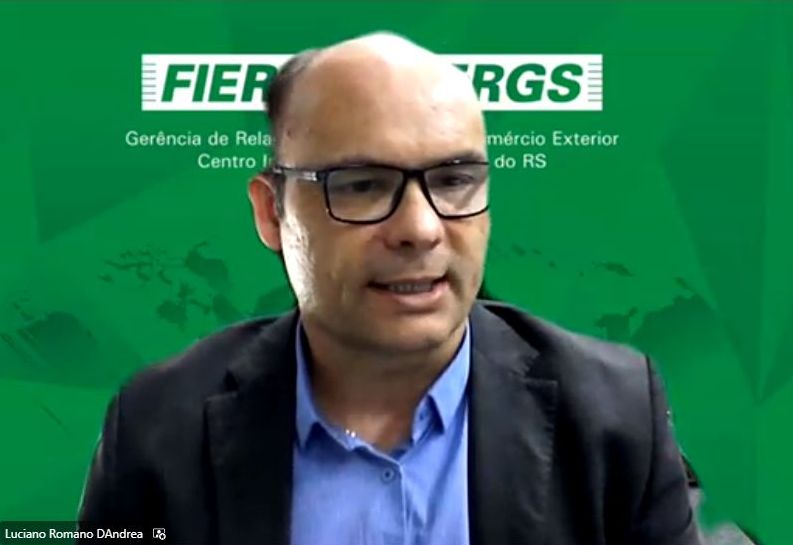São Paulo – Rio Grande do Sul is one of the Brazilian states exporting the most to the Arab markets. Nevertheless, the local private sector wants to grow in the supply and diversification of products shipped to the region. Initiatives to make this advance happen and which sectors have the potential for it were the subjects of the webinar “Business Opportunities in Arab Countries,” with business people from the state of Rio Grande do Sul, this Tuesday (31).
The online meeting was organized by the Federation of Industries of the State of Rio Grande do Sul (FIERGS) and the Arab Brazilian Chamber of Commerce (ABCC). The secretary-general and CEO of the ABCC, Tamer Mansour, and the International Relations and Foreign Trade manager of FIERGS, Luciano D’Andrea (pictured above), showed how the state is positioned in sales to Arabs and in which areas they believe there is a possibility of improvement.

Data from the ABCC shows from January to July this year, Rio Grande do Sul exported USD 598 million in products to the Arabs, with a 19.5% growth over the same period in 2020. They imported USD 815 million in goods from Arab countries, a 40.5% increase in the same comparison. Rio Grande do Sul had a deficit in its trade balance with the region, but it was the fourth state in Brazil exporting the most to the Arabs and the second in purchases from the region.
The state imported from the Arab countries in the first seven months of 2021 mainly fuels and fertilizers and exported mainly poultry, tobacco, wheat, and soy. “There is room to work on things involving more knowledge of culture and habits,” said D’Andrea, mentioning the halal products market (appropriate for Muslims), tourism, and clothing.
Analyzing data from 2019, the period before the pandemic, the FIERGS executive pointed out that despite the concentrated sales plan, the state ships several products to the Arabs, even if the exports are in small amounts. This means there is already an export precedent, according to D’Andrea. “The amount does not matter; for a small company, it is not the value that matters,” said the executive.
Read also:
The list of what the entrepreneurs from Rio Grande do Sul already export to the Arab market includes live animals, tools, leather, plastics, machinery, fruits, chemical products, rubber, cereals, wood, shoes, furniture, among others. Animal proteins, however, account for over half of exports, and tobacco, almost 15%, according to 2019 data. Tamer Mansour named areas which he believes the industry of Rio Grande do Sul can sell to the Arab market: sports equipment, household appliances, medicines, and animal feed.
Arabs buy through e-commerce
The secretary-general of the ABCC gave the entrepreneurs an insight into the Arab countries, their economic and demographic characteristics. According to him, there are 428 million inhabitants in the region, and a quarter of the population is young, aged between 10 and 24, which influences the profile of the business people with whom Brazilians will negotiate in the region. Mansour also spoke about halal consumption among the Arabs and the growth of e-commerce.
The revenue of online commerce platforms in the Middle East and North Africa (MENA) could reach USD 30 billion this year, above the USD 22 billion in 2020. Of the total number of internet users in the region, 48% make purchases via e-commerce. Mansour explained the ABCC is working to insert Brazilian companies into Arab e-commerce platforms and called business people from the state of Rio Grande do Sul to participate in the project.
The head of the Foreign Trade Council at FIERGS, Aderbal Fernandes Lima, participated in the meeting and showed interest in developing closer ties with the Arab market and the ABCC. About 50 people attended the online event, including executives of the ABCC, FIERGS, and other entities, as well as company representatives.
Translated by Elúsio Brasileiro




